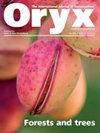使用短信调查了解鸣禽所有权和鲨鱼产品在印度尼西亚的消费
IF 2.1
3区 环境科学与生态学
Q2 BIODIVERSITY CONSERVATION
引用次数: 0
摘要
对野生动物的不可持续利用增加了物种灭绝的风险。在生物多样性丰富的印度尼西亚,有关野生动物利用规模的信息有限,需要进一步研究。为了解决这个问题,我们探索了短信(短消息服务;调查国内野生动物利用的水平和空间格局,以鸣禽饲养和鲨鱼消费作为案例研究,因为它们在印度尼西亚所有34个省都广泛存在。在2018年10月至11月期间,我们为每项调查发送了34万条信息,并以移动数据包作为奖励来激励回应。我们获得的调查回复率为1.4%(鸣禽所有权)和1.5%(鲨鱼消费)。我们的研究结果显示,估计有1.757亿只鸣禽被35%(8040 - 8660万)的印度尼西亚人口和3350万(14%)的印度尼西亚人口在其一生中食用鲨鱼产品。我们在爪哇的几个省确定了鸣禽所有权的热点,证实了先前的发现,例如在北苏门答腊省发现了新的热点。据报道,马鲁古省、亚齐省和东努沙登加拉省每1000人中食用鲨鱼的人数最多。调查结果表明,人们消费的鲨鱼产品种类繁多,因此需要进行深入研究,以了解这些行为背后的解释因素。这些发现表明,SMS调查可能是一种具有成本效益的方法,可用于开展短期内野生动物消费模式的大规模研究。本文章由计算机程序翻译,如有差异,请以英文原文为准。
Using SMS surveys to understand songbird ownership and shark product consumption in Indonesia
Abstract The unsustainable use of wildlife increases the risk of species extinction. In biodiversity-rich Indonesia, information on the scale of wildlife use is limited and requires further study. To address this, we explored the potential of text messaging (short message service; SMS) surveys to investigate levels and spatial patterns of domestic wildlife use, using songbird keeping and shark consumption as case studies because of their widespread occurrence in all 34 Indonesian provinces. We sent 340,000 messages for each survey during October–November 2018 and incentivized responses with a mobile data package as reward. We obtained survey response rates of 1.4% (songbird ownership) and 1.5% (shark consumption). Our results revealed an estimated 175.7 million songbirds being kept by 35% (80.4–86.6 million) of the Indonesian population and 33.5 million people (14% of the Indonesian population) to have consumed shark products in their lifetime. We identified hotspots of songbird ownership in several provinces in Java, corroborating previous findings, and new ones in the North Sumatra province, for example. The provinces of Maluku, Aceh and East Nusa Tenggara had the highest numbers of reported shark consumers per 1,000 people. Responses indicated a wide variety of shark products being consumed, highlighting the need for in-depth research to understand the explanatory factors behind these practices. These findings demonstrate the potential of SMS surveys to be a cost-effective approach for conducting large-scale studies on wildlife consumption patterns over a short period of time.
求助全文
通过发布文献求助,成功后即可免费获取论文全文。
去求助
来源期刊

Oryx
环境科学-生态学
CiteScore
5.30
自引率
7.40%
发文量
150
审稿时长
18-36 weeks
期刊介绍:
ORYX—THE INTERNATIONAL JOURNAL OF CONSERVATION, a quarterly journal from Fauna & Flora International, publishes research on biodiversity conservation, conservation policy and sustainable use, and the interactions of these matters with social, economic and political issues. The journal has a particular interest in material with the potential to improve conservation management and practice. Explore the map for details of published articles.
 求助内容:
求助内容: 应助结果提醒方式:
应助结果提醒方式:


